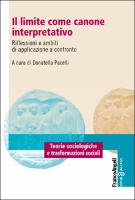Il limite come canone interpretativo
Riflessioni e ambiti di applicazione a confronto
Contributor(s)
PACELLI, Donatella (editor)
Language
ItalianAbstract
"Facts and processes of the contemporary world challenge different knowledge to reflect on the meaning of
actions, relationships, communication of women and men, as cultural actors or decision-makers
in order not to be subjected to them uncritically.
A way to respond to this challenge can be working on the topic of the limit, shedding light on the contradictions it shows. The problem given by human limitation - challanged by unlimited desires - is certainly not the exclusive prerogative of our age, nor the univocal consequence of the social, cultural, techonlogical and economics developmentent. Therefore the meanings related to concept of limit allow us to address with realism the relationship between the human’s instances and the social and cultural conditions generated by contemporary scenarios where our daily life takes place.
The purpose of this volume is to analyse, through the proposals of authors who work in different research fields, the meaning of the physical and symbolic limit, reflecting on existential, social and cultural experiences that can be interpreted as the consequence of a different shadows of human limits.
This is a way to experience the use of concepts and semantics which allow us to analyse the processes that are responsible for the breakdown of the balance between subjectivity and context, as well as contributing to the reconciliation between scientific production and moral feeling."
Keywords
limit; technology; morality; border; parenthood; social integration; knowledgePublisher
FrancoAngeliPublisher website
https://www.francoangeli.it/Home.aspxPublication date and place
2019Series
Teorie sociologiche e trasformazioni sociali - Open Access, 3Classification
Society and Social Sciences
Sociology


 Download
Download Web Shop
Web Shop